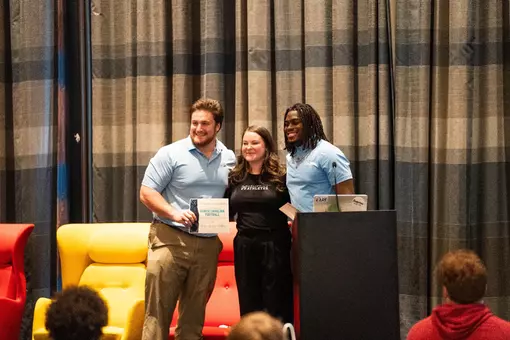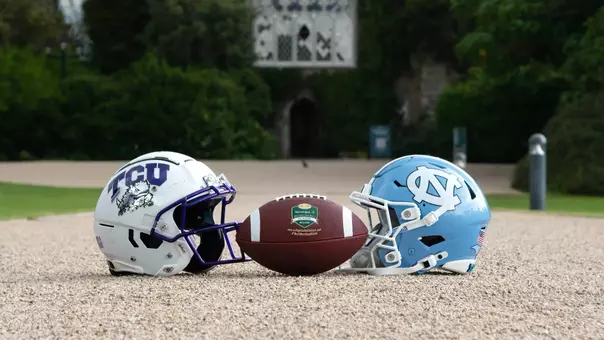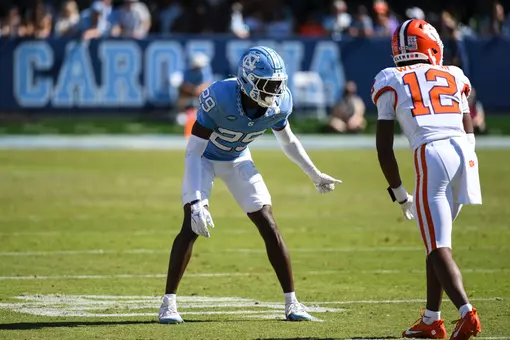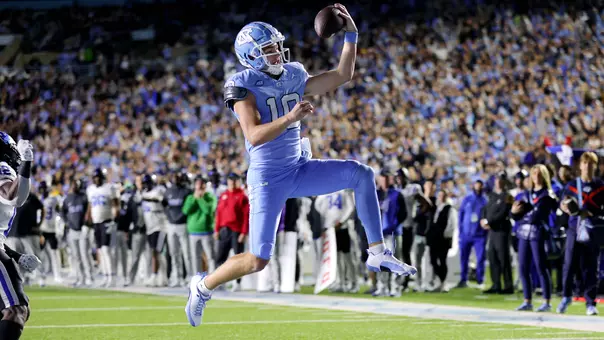University of North Carolina Athletics
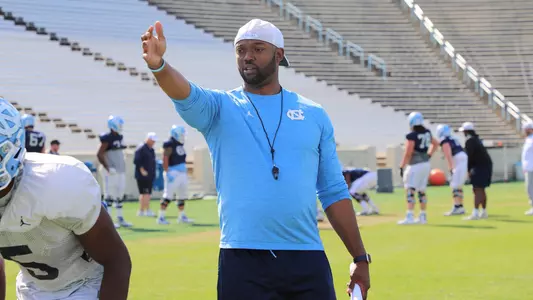
Five With Coach Baker
April 20, 2018 | Football
By Jeff Greenberg
Henry Baker joined the Tar Heel coaching staff this spring and is one of the newest members of John Papuchis' defensive staff, working primarily with the cornerbacks. Baker couldn't be more excited about coming to Chapel Hill and took some time to speak about this new opportunity.
1. How did North Carolina get on your radar and what ultimately drew you to Chapel Hill?
"Well first, I played football at Maryland back when Maryland was still in the ACC. So my familiarity with the North Carolina program was strong and I always kept an eye on the program and its tradition in football. So I've always had an interest in Carolina and when JP(Coach Papuchis) gave me a call I knew that it was something I wanted to pursue. I've gotten to know JP through recruiting. I've always recruited the Maryland/D.C./Virginia area and he's recruited that area as well. People always spoke highly of him as a recruiter and a coach so I considered this a great opportunity to come work for somebody that people I know respected. Plus, I always liked the atmosphere here when I came here as a player and as a coach. That Carolina Blue is special."
2. What made you say yes?
"Once I got a chance to meet with Coach Fedora and see the type of program he is building here, I knew I was all in at that point. The opportunity to work with this staff drew me in immediately. There is a ton of knowledge and experience on this staff, and what I like is that their experience is from a lot of different programs and backgrounds. I felt like the next step in my coaching career needed to be a place that keeps expanding my base of knowledge and exposure to different coaching backgrounds. When I looked at what I could learn from Coach Fedora and JP, and then work closely with a legend like Coach Thigpen, it was a no-brainer in the end for me."
3. What's the most difficult thing facing young coaches who are trying to break into the Power 5 opportunities like this one?
"Well first of all, there aren't many of these positions out there and when they do open up most head coaches have a list of guys they keep in case they have openings. As a young coach, if you don't have a network of people speaking on your behalf or helping you meet these coaches, you'll never get on those lists. The power of your network and the ability to establish one is the biggest thing you have to do to advance your career. The bottom line here though is it takes hard work to get here. You have to grind it out and prove yourself in your first jobs in order to get the opportunity to get one of these jobs. There are no shortcuts. Everybody has been in your shoes and everybody usually starts somewhere below the Power 5. Now, I know I've worked hard to get here but I'm not too proud to say that there is some luck and timing involved too. Having a great resume is fine, but I didn't know that call from JP was coming. I was the beneficiary of great timing and some luck. Of course, he wouldn't be calling me if he didn't think I could coach, but he was calling me because of the combination of my network and my track record. It all goes together in this business for young guys trying to get these jobs."
4. When you're picking up a new position room do you like to watch those guys on film first or do you like to wait and see what they show you in person on the field?
"I think I like to do both to be honest. I like to watch the film from last season. I think that helps me know who I'm working with and gives me a baseline of where we're starting from. What I'm looking for on the film are ways that I can add to what they are doing well. My job is to get those guys to be able to play at their highest level. So I'm looking for how I can add to their game and get them to that level. I think every player wants to learn, wants to keep getting better at what they do. The sooner I can sit down with them the better. That allows us to talk through their goals, where they're at now and how we can elevate what they're doing. It gets us all on the same page. When you reach that point then that's where the trust or building of trust begins because they know I'm invested in them and what they need individually from me. The other side of that is then getting to know them as a person off the field as well. What we do here isn't just football. I'm in the business of cultivating young men too off the field so that they can have the best experience possible here at Carolina. Trust and respect are earned on both sides of this equation and I'm strong believer that it has to include the player and the person in everything I do with them. So, to answer your question, it's all of the above. I want to watch film, watch them workout and sit down to get to them personally. I love this part of the job."
5. This will be the first time this staff has broken up the responsibilities of the defensive backs between two coaches for the safeties and the cornerbacks. How do you envision that setup and is it one that you're familiar with from past jobs?
"Actually, I've always worked in this setup. Starting with my time at Delaware, I've always been in this setup with the defensive backs. I worked with Nick Rapone there at Delaware. He was a mentor and a great defensive mind to learn from for me. When I moved on to Rutgers I worked there with Bill Bush, who was the safeties coach there. So this is normal for me. I think in this day and age the defensive philosophies have advanced so much with regards to DBs that you benefit from having them broken up by position. The techniques are so different that it helps to have one coach touching on all of the details for that one position. I think the players here will like that because they'll have more time and focus on them and what they need to do in their individual roles to get better. More attention to the details will help them elevate their play faster."
Henry Baker joined the Tar Heel coaching staff this spring and is one of the newest members of John Papuchis' defensive staff, working primarily with the cornerbacks. Baker couldn't be more excited about coming to Chapel Hill and took some time to speak about this new opportunity.
1. How did North Carolina get on your radar and what ultimately drew you to Chapel Hill?
"Well first, I played football at Maryland back when Maryland was still in the ACC. So my familiarity with the North Carolina program was strong and I always kept an eye on the program and its tradition in football. So I've always had an interest in Carolina and when JP(Coach Papuchis) gave me a call I knew that it was something I wanted to pursue. I've gotten to know JP through recruiting. I've always recruited the Maryland/D.C./Virginia area and he's recruited that area as well. People always spoke highly of him as a recruiter and a coach so I considered this a great opportunity to come work for somebody that people I know respected. Plus, I always liked the atmosphere here when I came here as a player and as a coach. That Carolina Blue is special."
2. What made you say yes?
"Once I got a chance to meet with Coach Fedora and see the type of program he is building here, I knew I was all in at that point. The opportunity to work with this staff drew me in immediately. There is a ton of knowledge and experience on this staff, and what I like is that their experience is from a lot of different programs and backgrounds. I felt like the next step in my coaching career needed to be a place that keeps expanding my base of knowledge and exposure to different coaching backgrounds. When I looked at what I could learn from Coach Fedora and JP, and then work closely with a legend like Coach Thigpen, it was a no-brainer in the end for me."
3. What's the most difficult thing facing young coaches who are trying to break into the Power 5 opportunities like this one?
"Well first of all, there aren't many of these positions out there and when they do open up most head coaches have a list of guys they keep in case they have openings. As a young coach, if you don't have a network of people speaking on your behalf or helping you meet these coaches, you'll never get on those lists. The power of your network and the ability to establish one is the biggest thing you have to do to advance your career. The bottom line here though is it takes hard work to get here. You have to grind it out and prove yourself in your first jobs in order to get the opportunity to get one of these jobs. There are no shortcuts. Everybody has been in your shoes and everybody usually starts somewhere below the Power 5. Now, I know I've worked hard to get here but I'm not too proud to say that there is some luck and timing involved too. Having a great resume is fine, but I didn't know that call from JP was coming. I was the beneficiary of great timing and some luck. Of course, he wouldn't be calling me if he didn't think I could coach, but he was calling me because of the combination of my network and my track record. It all goes together in this business for young guys trying to get these jobs."
4. When you're picking up a new position room do you like to watch those guys on film first or do you like to wait and see what they show you in person on the field?
"I think I like to do both to be honest. I like to watch the film from last season. I think that helps me know who I'm working with and gives me a baseline of where we're starting from. What I'm looking for on the film are ways that I can add to what they are doing well. My job is to get those guys to be able to play at their highest level. So I'm looking for how I can add to their game and get them to that level. I think every player wants to learn, wants to keep getting better at what they do. The sooner I can sit down with them the better. That allows us to talk through their goals, where they're at now and how we can elevate what they're doing. It gets us all on the same page. When you reach that point then that's where the trust or building of trust begins because they know I'm invested in them and what they need individually from me. The other side of that is then getting to know them as a person off the field as well. What we do here isn't just football. I'm in the business of cultivating young men too off the field so that they can have the best experience possible here at Carolina. Trust and respect are earned on both sides of this equation and I'm strong believer that it has to include the player and the person in everything I do with them. So, to answer your question, it's all of the above. I want to watch film, watch them workout and sit down to get to them personally. I love this part of the job."
5. This will be the first time this staff has broken up the responsibilities of the defensive backs between two coaches for the safeties and the cornerbacks. How do you envision that setup and is it one that you're familiar with from past jobs?
"Actually, I've always worked in this setup. Starting with my time at Delaware, I've always been in this setup with the defensive backs. I worked with Nick Rapone there at Delaware. He was a mentor and a great defensive mind to learn from for me. When I moved on to Rutgers I worked there with Bill Bush, who was the safeties coach there. So this is normal for me. I think in this day and age the defensive philosophies have advanced so much with regards to DBs that you benefit from having them broken up by position. The techniques are so different that it helps to have one coach touching on all of the details for that one position. I think the players here will like that because they'll have more time and focus on them and what they need to do in their individual roles to get better. More attention to the details will help them elevate their play faster."
UNC Baseball: Hull, Schaffner Lift Tar Heels Over NC A&T, 9-1
Tuesday, February 24
Chloe Humphrey Receives 2025 Honda Award - February 23, 2026
Tuesday, February 24
Carolina Insider: Rapid Reactions – Men’s Basketball vs. Louisville – February 23, 2026
Tuesday, February 24
MBB: Hubert Davis Post-Louisville Press Conference
Tuesday, February 24











